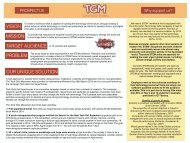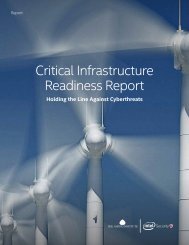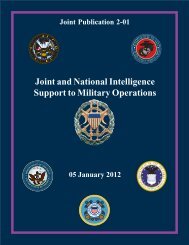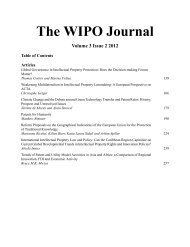Transparency Initiative (EITI)
2eoch1l
2eoch1l
Create successful ePaper yourself
Turn your PDF publications into a flip-book with our unique Google optimized e-Paper software.
18 Introduction<br />
2.2 THE ROLE OF GERMANY<br />
The German government considers the <strong>EITI</strong> as an anchor<br />
point for engaging with international partners around the<br />
world to strengthen good governance in the extractives<br />
sector. With regard to defining a strategy within the portfolio<br />
of the Federal Ministry for Economic Cooperation and<br />
Development (BMZ), it is formulated in sector (BMZ, 2010)<br />
and several country policies that partner countries use<br />
their resource endowments to foster sustainable development.<br />
Broadly this means that countries are looking to ensure<br />
that revenues benefit the population at large and that<br />
resource extraction is socially and environmentally acceptable.<br />
Furthermore, in order for the extractives sector to<br />
become a driver of broader employment and growth, linkages<br />
between major projects in the sector and the local<br />
economy must be established.<br />
In principle, BMZ policies link the <strong>EITI</strong> transparency<br />
agenda to Good Financial Governance (GFG) and<br />
economic and social reform agendas. This means that<br />
support of the <strong>EITI</strong> is geared towards framing it in Public<br />
Financial Management (PFM), as well as more specific<br />
good governance interventions such as the Open Data<br />
Movement, the Tax Justice Movement (e.g. on transfer<br />
pricing issues), the Addis Ababa Action Agenda’s Domestic<br />
Resource Mobilization (DRM) program, although the<br />
linkages vary depending on the country context. The <strong>EITI</strong><br />
plausibly contributes to the Sustainable Development<br />
Goal (SDG) 17 (“Partnerships for the Goals – Strengthen<br />
the means of implementation and revitalize the global<br />
partnership for sustainable development”) among others<br />
(CCSI 2016, p. 66-68).<br />
Bank managed <strong>EITI</strong> Multi-Donor Trust Fund (MDTF) (2004<br />
until 2015), and since then Component I of the Extractives<br />
Global Programmatic Support (EGPS).<br />
In 2014, Germany started domestic implementation and<br />
since February 2016, Germany is an <strong>EITI</strong> candidate, aiming<br />
to become <strong>EITI</strong> compliant in 2018. This step was taken in<br />
coordination with the G7. Among the countries that make<br />
up the G7, EU and OECD, the <strong>EITI</strong> is implemented by:<br />
``<br />
three of the G7 member states (43%)<br />
``<br />
two of the 28 EU member states (7%)<br />
``<br />
four of the 35 OECD member states (11%)<br />
A growing number of industrialized nations are participating<br />
in the <strong>EITI</strong>: Great Britain since October 2014, the USA<br />
since March 2014; Norway has been a member since 2011;<br />
and other countries have announced an intention to implement<br />
the <strong>EITI</strong>, including Australia, the Netherlands, France<br />
and Italy. The BRICS countries (Brazil, Russia, India, China<br />
and the Republic of South Africa) have long been a focus of<br />
<strong>EITI</strong> advocacy and outreach, but thus far none of them have<br />
chosen to implement the <strong>EITI</strong>.<br />
In a whole-of-government-approach, the <strong>EITI</strong> was introduced<br />
to the German Government’s raw materials strategy<br />
in 2012 in terms of "safeguarding of the supply of raw materials<br />
needs to be backed by a committed foreign policy,<br />
external economic policy and development co-operation<br />
policy" (BMWi, 2012: 26). German support has been broadbased<br />
from the very beginning: More than EUR 26 million<br />
have been allocated since 2006, supporting more than 20<br />
national <strong>EITI</strong> processes through bilateral and regional cooperation,<br />
conducting training for more than 500 change<br />
agents from 44 countries (outreach and implementing<br />
countries), supporting activities under the first <strong>EITI</strong> Chair<br />
Peter Eigen (2006-2011), funding the International Secretariat<br />
as well as at the multilateral level through the World









